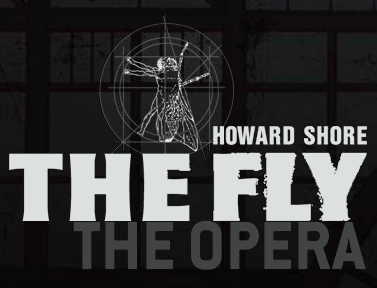
Excerpted from a piece for an upcoming issue of Film Score Monthly Online:
*****
Much of the criticism lobbed at The Fly seems to have been written before critics made the trek to the opera house. Maybe it’s the result of an overzealous promotional campaign that pushed the star-studded behind-the-scenes roster rather than promoting an understanding of the work itself. Maybe more should have been made of the opera’s place in the Shore/Cronenberg canon – how the work drew from established tones and themes, yet pushed the pair into entirely new regions. Maybe there’s a lack of understanding when it comes to modern opera. I actually read one review that complained that the opera lacked a key signature! There were a couple of very intelligent reviews by critics who didn’t like the work, but still offered articulate insight. Tomasini’s piece in The New York Times was great. I disagreed with his conclusions, but it’s sharply written – and musically accurate! (A lamentable rarity on today’s critical landscape.)
But, methinks I risk protesting too much. The Fly speaks for itself. It doesn’t need me to defend it… though I can certainly tell you what I liked.
Tonal consistency has always been a hallmark of Shore and Cronenberg’s work together. Once they establish the tone of a piece, everything grows out of that tone. The humor, the horror, the joy, the pathos. This opera is no different. Shore’s harmonic language is very specific and very controlled in the work. It’s also very mature… consistently chromatic, very stepwise, rhythmically fluid, through-composed. It maintains this sound through all moods, though the orchestra forever paints it differently, sometimes embracing the winding vocal lines with warm triadic harmonies, sometimes battling the melodic fragments with cackling brass outbursts, sometimes complicating textures with counterlines, sometimes building dread with heart-beat cluster chords. There’s some wonderfully evocative text painting going on if one listens to the voices as contextualized by the orchestra. Shore has always treated the voice as an extension of his instrumental palette. Though the voices are out front here, this is no different. The static choral writing for the computer’s “voice” is particularly effective in this regard as it weaves its way through the writing to create a depth of texture… and yes, build even more dread.
The Fly has no intention of sensationalizing its subject matter. That’s not to say that sensationalistic treatment of lurid material discredits an opera. Look at Wozzeck! But Shore is not interested in replicating the ooky spooky aspects of the story. His score deals with greater themes. David Henry Hwang’s libretto demands no less. The Fly has always been used as a vehicle for deeper subjects. Even the 1958 Vincent Price played into the scientific paranoia of the early nuclear age. In the 1980s Brundle’s transformation was a metaphor for disease and the breakdown of the body. In the opera, Brundle is drawn between his mind and his flesh in a bid to better understand his own nature. Which is the true Brundle? There are also ruminations on the conjoined natures of life and death… birth being the first act of dying, death being the first act of a new state of existence. Twice the phrase “dying to be born” appears. But Brundle’s experiment only draws these questions into sharper focus. He never gets any closer to answering them. Shore’s is the music of these questions. It is not based on prominent recurring motifs or momentary retreats into the safety of familiar harmonic progressions. It searches and searches. Had the music offered any sanctuary, it would have been dishonest. That’s not what this is about. A beautiful tonal aria in the midst of all these unanswered questions would have dishonored the opera’s characters and intent.
The Fly is unforgivingly intelligent. It considers its own integrity as a piece of drama and music before it considers the audience’s comfort. In its refusal to pander it, it creates something so cerebral that it evokes an emotional response… even if that emotion is disquieting horror. Brundle’s tragedy is our own: an awareness of questions too big to answer. I don’t know that we feel bad for him in the end. Hubris guided his hand. But thanks to Shore’s challengingly effective writing, we can empathize. That’s exactly what art should do.
-Doug Adams








